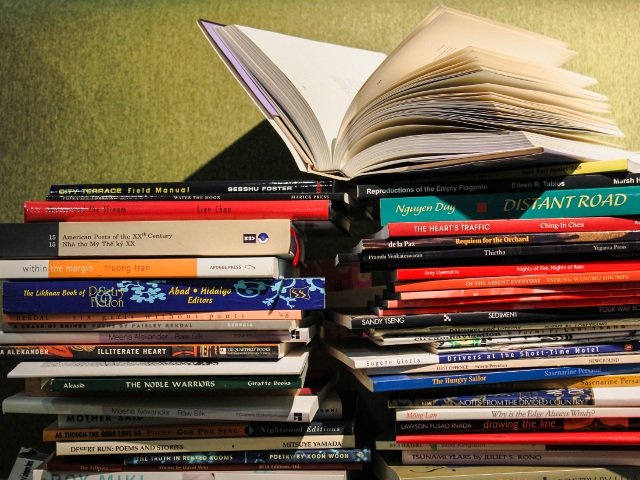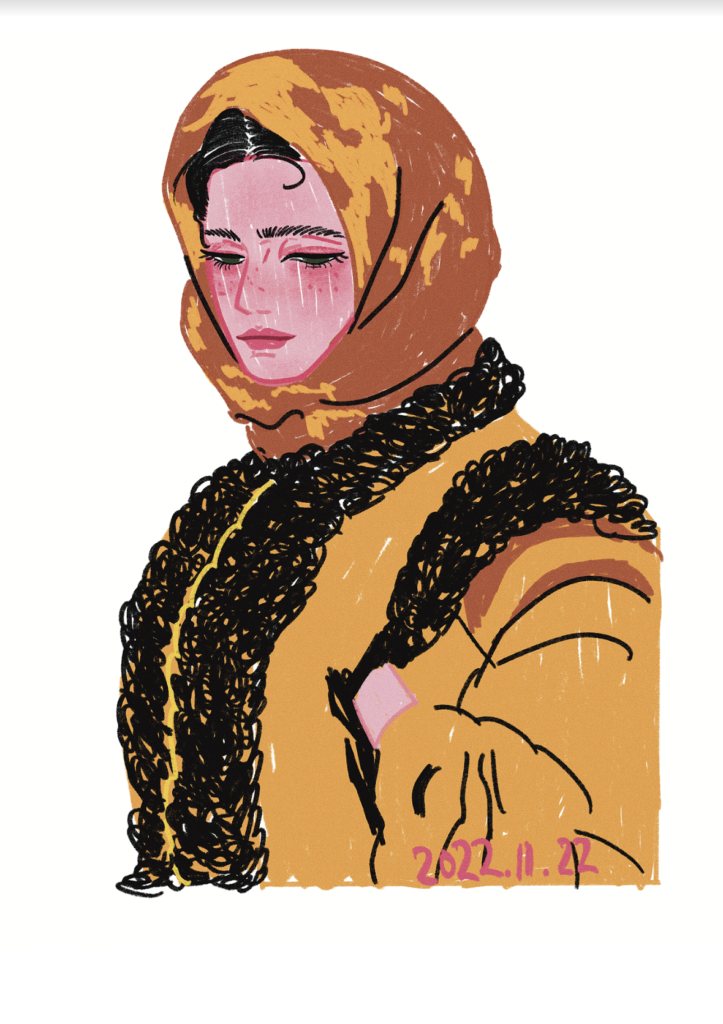“Asian American Poetry” is not a manageable category—it is not a list.

March 7, 2014
Last week, the country’s largest literary nonprofit, the Poetry Foundation, caused a minor embolism in the Asian American poetry community when it published what it called a “sampler of Asian American poetry.” (You can read it here.) The Poetry Foundation’s site features a list of contemporary poets who have “emerged out of a broad range of Eastern and Western influences,” along with links to Asian-themed Poetry Foundation archival content. (Disclosure: I’m one of the poets listed and the Asian American Writers’ Workshop is mentioned twice.) While the page seems intended as a “neutral” educational resource (akin to the Foundation’s pages on, say, The Sonnet), some writers have contested whether one can present “Asian American” poetry as a generic label, rather than as a site of resistance premised on racial justice. One of the most notable early criticisms was the way the site categorized Asian American writers by “country of heritage,” which, among other things, raised stereotypes of Asian Americans as perpetual foreigners. (You can read poet Timothy Yu’s take on this here.) The Poetry Foundation subsequently removed this category. As part of the Asian American Writers’ Workshop’s role as a community-based organization at the intersection of literature and racial politics, we’re providing a forum for the poets Don Mee Choi and Eunsong K and their critique/manifesto, “Refusal=Intervention.”
—Ken Chen
We are calling for Refusal=Intervention in the Poetry Foundation’s Poem Sampler, “Asian American Voices in Poetry: A collection of poets and articles exploring Asian American culture”—and their gracious call for our “help” to “improve this feature.” This call for help is fundamentally not generous. It is racist.
The Poetry Foundation’s listing practices are an admission that whiteness, and white American poetry, is dominant, prevalent, widespread, and canonical. There are no lists on white poetry because we live it, every day. We live the white American fantasy (destruction), every second of our lives.
Their listing practices demonstrate the supposition that whiteness cannot be organized, while other ethnic categories can be—by a white institution.
Refusal=Intervention is angry, naturally.
(We reject the caricature that anger is violent—US imperialism and drones are violent, ANGER as articulated by Audre Lorde, will continue to be our tool in decolonization.)
We are angry—do not rewrite our genealogy, do not position yourself as masters of our origin stories.
The genealogy of Asian American literature begins not with whiteness, or its relation to whiteness or white gatekeeping. We reject any rewriting.
Shawn Wong has positioned the genealogy of Asian American literature relationally and in solidarity with African American writers and presses: “African American writers were the first readers of Asian American literature, African American publishers were the only ones interested in publishing our work.” He recounts the many ways early Asian American writers collaborated with members of the Black Arts movement and Chicano writers, at conferences, in journals, for publication. There is a thriving and rich genealogy, and continuing present, of multi-ethnic writers and poets that existed in spite of being excluded from the gates of white institutions. This is to say that institutions like the Poetry Foundation were always behind, not ahead. And we do not need to applaud its entrance into Asian American Writing 101.
No, Refusal=Intervention is not a collaborator.
Sampling for whom? We are greatly confused by the framing of the feature as a ‘sampler’ coming from a poetry organization. Is this a metaphor for consumption? For cultural appropriation? Culture for the time-crunched individual residing in the global north? Sampler for whom? In “Eating the Other,” bell hooks writes that in our white supremacist, neoliberal society, “…ethnicity becomes spice, seasoning that can liven up the dull dish that is mainstream white culture.” Ethnicity as extra, as additional to whiteness, ethnicity as manageable next to whiteness, ethnicity as formulated via whiteness. You present us, and we are elevated into your visibility. We will not collaborate. “It is by eating the Other that one asserts power and privilege”—manageable, consumable, preparable, digestible as its director desires. No. We refuse. No to our consumption, no to our management. We will not cooperate.
Refusal=Intervention understands the mechanism by which knowledge/power is produced by an influential institution such as the Poetry Foundation. It does not want do its own dirty work. Obviously, it’s beyond it. Hence, the dirty work has been delegated to us in the plague ground (our feminist sister Joyelle Mcsweeney’s concept). The Poetry Foundation’s gracious call for help is none other than division of labor—highly classed, gendered, racial, and political. This is what we meant when we warned you against “the trap of racialized intellectual labor” on Facebook. Befriend us.
Refusal=Intervention also refuses to fall for the good old divide-and-conquer strategy, which keeps us busy thinking in the binary exclusion-inclusion nature of a list. If you find yourself on this path, it is not too late to deviate. Join us.
“Asian American Poetry” is not a manageable category, it is not a list.
As here the list fails in every way possible. If the list is the visual grouping of the racial markers of ‘Asian American,’ then the list fails via its horrendous exclusion (or prevails in its gatekeeping announcements). If the list was an epistemological experiment on the politics of Asian American cultural production, it fails to enunciate any of these concerns.
We want more reading of Asian American, Chicano, Latino, Black, Native, Arab American, Queer, trans poetics—and we will continue to contest the convenience of list making, the violence of white knowledge production, and the management of Othering. The Poetry Foundation is a space that has much catching up to do—and we ask that it catches up without putting us through its imperial timeline, gaze.
Identity categories are interesting because of the broad spectrum of their reach—they are both exhilarating and extremely limiting and problematic. Does the identity of Asian American mark a shared experience of colonization & decolonial dreams, forced assimilation, war driven immigration, being touched (and at times erased) by US imperialism, a demarcation of the model minority mythology (complicit in anti-black racism)?—Asian American is a political identity, stirring inside our settler colonial milieu. The Poetry Foundation’s listing marks Asian American as a visual, consumer-based group. It is an exercise that is expected of them—but we refuse.
Grace Hong: “[I]n the current era, global capital reproduces itself exactly by manipulating racial, gender, and sexual difference for the purposes of accumulation. In other words, if “Asian American” or “Chicano” or “African American” are categories that assert racialized subjectivity as a critique of white supremacy and the corresponding logic of assimilation, they are now equally ways of identifying and producing consumer bases, or alternatively, pools of exploitable labor.”
It is expected that the Poetry Foundation took Asian American as a consumer base, rather than the formation of a critique of white supremacy. Samples of the project! Samples for the consumers! We refuse. We refuse their weaponization of this identity category.
Refusal=Intervention has no patience for benevolent multiculturalism. We quote our queer brother, Lucas de Lima: “gross.” We quote our translational and Asian American brother, Chiwan Choi: “lazy.” Lucas de Lima again: “We need to put pressure on the fact that mainstream taste is always white, heterosexist, classist, able-bodied, etc, and to use opportunities like this one as a way of forcing a discussion the Poetry Foundation and others obviously do not want to have because it would demand much more than the multiculturalist gesture.”
Refusal=Intervention needs no analogy, but if it were to have one, it would be our former labor organizer, translator, brother, Lucas Klein’s call against the imperialist practice of omitting translators’ names in book reviews. He said we should not be grateful for getting our translations reviewed even if our names are omitted.
Refusal=Intervention is not impressed by the Poetry Foundation’s call for “help,” that is to say, we are not grateful.
We are not asking for an apology. An apology is not a decolonizing act. We are asking for decolonization of your whiteness, of your white lists, of your listing practices.
We reject your buffet. We reject your retelling, your management, your desires.
Refusal=Intervention. It’s what our feminist sister, Sara Ahmed, calls: feministkilljoy.
Refusal=Intervention is a political act. We aspire for a decolonizing act.
Refusal=Intervention is grateful for your solidarity.



